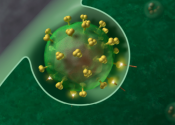The subcellular dynamics of RNA stabilizing molecule in response to inflammation
A research group at Osaka University revealed the regulatory mechanism of subcellular localization of Arid5a in response to inflammation. It has been known that an inflammatory accelerator is localized in the nucleus, and ...
Feb 1, 2018
0
1









